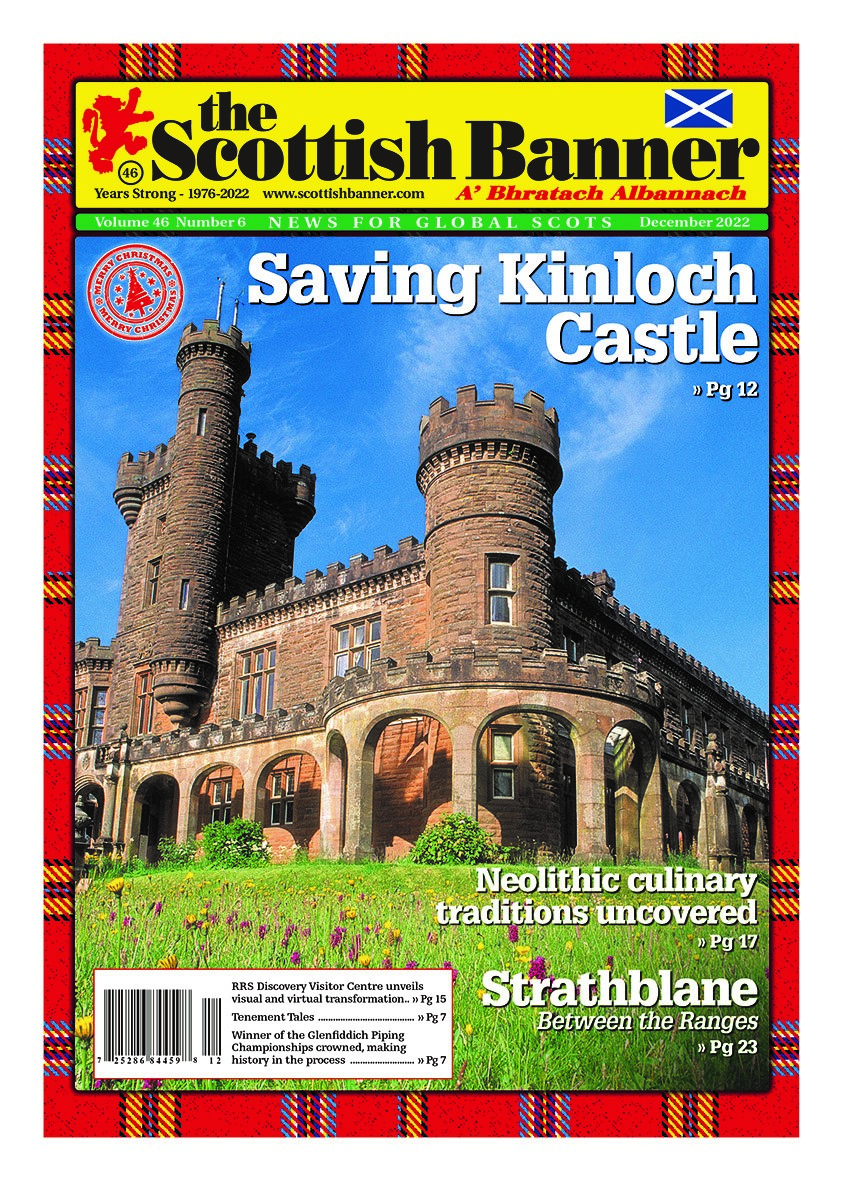December – 2022 (Vol. 46, Number 06)
The Banner Says…
The cancellation of Christmas
When most people receive this month’s edition of the Scottish Banner, they will no doubt be looking at a busy month ahead with festive events, get-togethers with friends and family and perhaps just spending a little bit too much money on gifts, food and festive cheer.
I remember as a child the excitement of going to bed on Christmas Eve and wondering what might be in some of those wrapped packages bearing my name on them. We were lucky to have as part of our family tradition the offer of opening a small gift on Christmas Eve before going to bed and getting some milk, cookies and of course carrots out for Santa and his loyal crew of reindeer.
Banning Christmas
I am glad those traditions were part of my growing up and cannot imagine not having them as part of my childhood memories. However, for many years Scottish children did not have such traditions as part of their growing up experiences. Some may be surprised to learn that Christmas was actually banned in Scotland for centuries. Christmas had its early origins in Scotland when those fierce Vikings raided the land and made communities in Scotland from the 8th century, with them they brought the custom of celebrating the winter solstice in a pagan festival which became known as yule.
Yule was a multiday celebration which honoured their ancestors in the darkest time of the year, this eventually became a Christian tradition. During the Reformation years Scottish Protestant kirks broke ties with the Catholic Church and thus began to cut ties with all things Christmas.
Christmas was abolished in 1640 by the Scottish parliament as it was seen as a Roman Catholic tradition and celebrating Christmas became illegal. The law was strictly enforced, and it was even illegal to bake a yule log or sing a Christmas carol. And though you would no longer be thrown into prison for celebrating Christmas, it did become just another working day for many Scots well into the 20th century. Whilst some of the banned period may feel like part of medieval history it was not in fact until 1958 that Christmas even became a public holiday in Scotland, that is less than 70 years ago.
Even more recently, Boxing Day did not become recognised as a holiday in Scotland until 1974. In some parts of the country, December 26th was Sweetie Scone Day, when the Lord or Lady of the estate would give cakes made with dried fruit and spices to their workers and the poor (who couldn’t afford these luxurious ingredients).
In this issue
The iconic Kinloch Castle is located on the Isle of Rum. Built in the late 1800s, the A listed Victorian mansion has quite a history and was once a playground for the rich, privileged and famous of England and Scotland. Sadly, the state of the Kinloch Castle has fallen in such bad shape it needs someone with very deep pockets to get it back on track. The small but passionate local Rum community also have their ideas on how Kinloch should be restored and managed. A buyer is needed who will be both sympathetic to the castle and the community.
Strathblane is in Stirlingshire but just outside of Glasgow making it an ideal commuter town. However, the rolling hills and green spaces that surround the area certainly let you know you are not in Glasgow. Visitors can enjoy walking and cycle trails, and picturesque drives. Not to mention the stunning hill ranges of the Campsies and a great whisky distillery. It is great we can highlight this lovely spot, and one that is quite easy to get to when you are next in Scotland.
Hogmanay
Scots of course were not completely deprived of fun and cheer during the festive period. They would whole heartedly embrace New Year’s Eve, or as we all know it Hogmanay, as back in the day Scots could not celebrate Christmas itself. Some amazing Scottish customs also have been developed over the years which still take place today. Many Hogmanay celebrations still light up the dark cold night with fire, from torchlight processions to fire ball ceremonies Scotland holds on to these unique celebrations which signify the Winter Solstice, ancestors and the rejuvenating energy of the sun.
Speaking of fire some Scots still practice the tradition of burning a twig from a rowan tree during the festive season. It is believed that burning rowan gets rid of jealousy or mistrust between family, friends and neighbours. Hundreds of years ago it was popular to burn a Yule log and the ashes were considered lucky and would protect the house for the year ahead. From this tradition some Scots today burn a candle in the window as a welcome to family, friends and even strangers.
Of course, Christmas is a joyous time for most of us today, however some will be doing it tough this holiday season. Some will be alone, some sick, some working, or just missing someone special who is not around the table this holiday season and I always think of them at this time of the year.
I hope you and yours have a safe, wonderful and happy holiday season. We also thank all our readers, customers, subscribers and advertisers for all their support in 2022.
Merry Christmas, or as some may know in Scots Gaelic, Nollaig Chridheil!
Do you practice any Scottish Christmas or Hogmanay traditions? Do you have you any comments from the content in this month’s edition? Share your story with us by email, post, social media or at: www.scottishbanner.com/contact-us
#ScottishBanner, #TheBanner
The Scottish Banner is more reliant than ever on our readers helping us to provide you with our unique content by buying a copy of our publication, regardless if by print or digital subscription or at a retail outlet.
We appreciate your support and hope you enjoy this edition.

